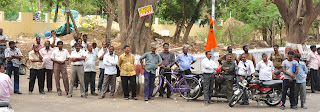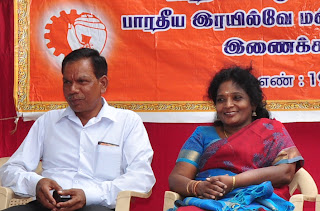No. 25013/02J2005-AIS II
Government of India
Ministry of Personnel, Public
Grievances & Pensions
(Department of Personnel &
Training)
New
Delhi, the 28th June, 2012
To
Chief
Secretaries to the
Government
of All States/Union Territories
Subject:
All India Services (Death-cum-Retirement Benefits) Rules, 1958 – Rule 16(3) —
Guidelines for intensive review of records.
Sir,
Rule 16(3) of the All India Services (Death-cum-Retirement
Benefits) Rules, 1958 has been amended on 31.01.2012 which provides as follows:
"The Central Government may, in
consultation with the State Government concerned, require a Member of the
Service to retire from Service in public interest, after giving such Member at
least three month's previous notice in writing or three month's pay and
allowances in lieu of such notice, -
(i) after the review when such Member completes
15 years of qualifying Service; or
(ii) after the review when such Member completes
25 years of qualifying Service or
attains
the age of 50 years, as the case may be; or
(iii) if the review referred to in (i) or (ii)
above has not been conducted, after the review at any other time as the Central
Government deems fit in respect of such Member.
Explanation: - For the purposes of sub-rule (3),
"review" means the review of the entire service record of the Member
of the Service regarding suitability or otherwise of such Member for further
retention in the Service, to be conducted regularly of each Member of such
Service, firstly, after his completion of 15 years of qualifying Service, and
secondly, after his completion of 25 years of qualifying Service or on his
attaining the age of 50 years, as the case may be, or if the review referred to
in clauses (i) or (ii) of this sub-rule has not been conducted in respect of
such Member, such review may be conducted at any other time as the Central
Government deems fit."
2.
The rule, commonly referred to as
the rule of premature retirement, is based on sound policy and in order to
subserve public interest. Explaining the objects of the rule, the Supreme Court
observed in the case of Union of India Vs. M.E. Reddy and another (AIR 1980 SCC
563) as follows :
(i) "The object of the Rule is to weed out
the deadwood in order to maintain a high standard of efficiency and initiative
in the State Services. It is not necessary that a good officer may continue to
be efficient for all times to come. It may be that there may be some officers
who may possess a better initiative and higher standard of efficiency and if
given chance the work of the Government might show marked improvement. In such
a case compulsory retirement of an officer who fulfils the conditions of Rule
16(3) is undoubtedly in public interest and is not passed by way of
punishment."
(ii) "Compulsory retirement contemplated by
the aforesaid rule is designed to infuse the administration with initiative
………… so as to meet the expending needs of the nation, which require exploration
of "fields and pastures new". Such a retirement involves no stain or
stigma nor does it entail any penalty or civil consequences. In fact, the rule
merely seeks to strike a just balance between the termination of the completed
career of a tired employee and maintenance of top efficiency in the diverse
activities of administration."
3.
The Supreme Court has observed in
the case of State of Gujarat Vs. Umedbhai M. Patel (Civil Appeal No.1561 of
2001, 3 SCC:320 as follows:
(i) Whenever
the services of a public servant are no longer useful to the general
administration, the officer can be compulsorily retired for the sake of public
interest.
(ii) Ordinarily, the order of compulsory retirement is not to be
treated as a punishment coming under Article 311 of the Constitution.
(iii) "For better administration, it is necessary to chop off dead
wood, but the order of compulsory retirement can be passed after having due
regard to the entire Service record of the officer"
(iv) Any adverse entries made in the confidential record shall be taken
note of and be given due weightage in passing such order.
(v) Even
un-communicated entries in the confidential record can also be taken into
consideration.
(vi) The order of compulsory retirement shall not be passed as a short
cut to avoid Departmental enquiry when such course is more desirable.
(vii) If the officer was given a promotion despite adverse entries made
in the confidential record that is a fact in favour of the officer.
(viii) Compulsory retirement shall not be imposed as a punitive measure.
4.
These same principles relating to
retirement in public interest apply to the revised Rule 16(3) of the AIS (DCRB)
Rules, 1958.
5.
Members of the All-India Services
are appraised periodically before they are allowed to move to the next higher
level. Such appraisal takes place when a member is appointed to the Selection
Grade or Super Time Scale. An appraisal also takes place when a member is
appointed to higher management posts at the level of Additional Secretary or
Secretary to the Government of India (or equivalent levels in the State
Government). It is essential that such appraisals should be rigorous and any
fall in standards should be noticed immediately.
6. A member of
the All-India Service who has completed 15 years of qualifying service or has
completed 25 years of qualifying service or attained the age of 50 years will,
invariably, be found to occupy a senior administrative post. It would not be
acceptable to find that such a member has become a mere passenger in the senior
level in which he/she is placed. One must always guard against the operation of
the `Peter Principle'*.
7.
Nevertheless, it is sometimes found
that a few members of the All-India Services do tend to become mere passengers
in the post or at the level in which a member is placed for the time being.
They become either stale or listless; they do not exhibit any creativity or
innovativeness; and they do not achieve results. In some other cases,
information may be available which casts grave doubt upon the integrity of a
member. The form of the Annual Confidential Report/Performance Appraisal Report
is designed in order to bring out, as far as possible, these tendencies or
traits, which would alert Government to take suitable action under the rules.
8.
It is seen that in some cases the
overall grade or assessment given on the performance of a member of an
All-India Service is "average". To describe a member of an All-India
Service as average is not complimentary. While it may not be an adverse remark,
it is nevertheless a reflection upon his work or conduct and should be taken to
indicate output, which is ordinary and routine. Remarks like
"Adequate" and "Satisfactory" over a period of 5-7 years,
without mention of any notable achievement, would also indicate that the member
has reached a plateau. Similarly, it is found that in some cases, a member of
an All-India Service receives a lukewarm or equivocal certificate of integrity.
Such an entry would indicate that there is some doubt in the mind of the Reporting/Reviewing
authority about the integrity of the member. In all such cases, it would be
quite appropriate for the Government to examine the matter thoroughly in order
to decide whether action under Rule 16(3) of A1S (DCRB) Rules, 1958 would be
warranted.
9.
The procedure for review under Rule
16(3) has been laid down in this Department's letter No. 25013/12/86-AIS-11
dated 31.7.1987. These stand further modified and enclosed herewith consequent
to the revised rule 16(3) in the light of introduction of intensive review at
two stages.
10.
The State Governments are required to
carry out a review in respect of:-
(i) All
officers who have completed 15 years of qualifying service;
(ii) All officers who have completed 25 years of qualifying service or
attained the age of 50 years, whichever is earlier, subject to the following
conditions;
a) An
officer should have completed minimum 15 years of qualifying service;
b) In
the case of the State Service Officers appointed to an All India Service by
promotion or by selection, they should have completed a minimum of 5 years of
actual service in the respective All India Service.
11.
Additionally, there may be officers
who may have completed 16 years or more of qualifying service but their review
was not carried out as the rule has been amended recently. Therefore, a review
is required to be carried out by the State Governments in respect of the
officers who have completed qualifying service of 16-23 years and the
recommendations of the respective State Governments may be sent to the Central
Government for further necessary action within six months of the issuance of
this letter.
12.
It is clarified that in the above
rule, the officers who will be retired prematurely shall be entitled for
pensionary benefits in terms of the relevant provisions of All India Services
(DCRB) Rules, 1958.
*commonly
known as 'employee tends to rise to the level of incompetence'.
Sd/-
(Dr.
S.K.Sarkar)
Additional
Secretary to the Government of India































